Comprehensive Report: Logistics & Supply Chain Management in Business
VerifiedAdded on 2023/01/11
|11
|1447
|79
Report
AI Summary
This report provides a detailed analysis of logistics and supply chain management, focusing on key aspects such as transportation, the impact of information technology, and the core principles of logistics. The report uses Unilever as a case study to illustrate these concepts, examining how the company manages its supply chain, including storage, inventory management, and delivery processes. It explores the integration of IT in logistics, emphasizing its role in improving operational efficiency and competitiveness. The report also outlines the principles of logistics management, customer segmentation, network customization, and strategic supply source management. Finally, it discusses value chain strategy, highlighting how value is generated at each stage of the supply chain to support functional areas like HR, IT, and finance, ultimately contributing to overall business success. The conclusion summarizes the importance of integrating logistics and supply chain management to provide value to customers and adapt to evolving IT requirements.
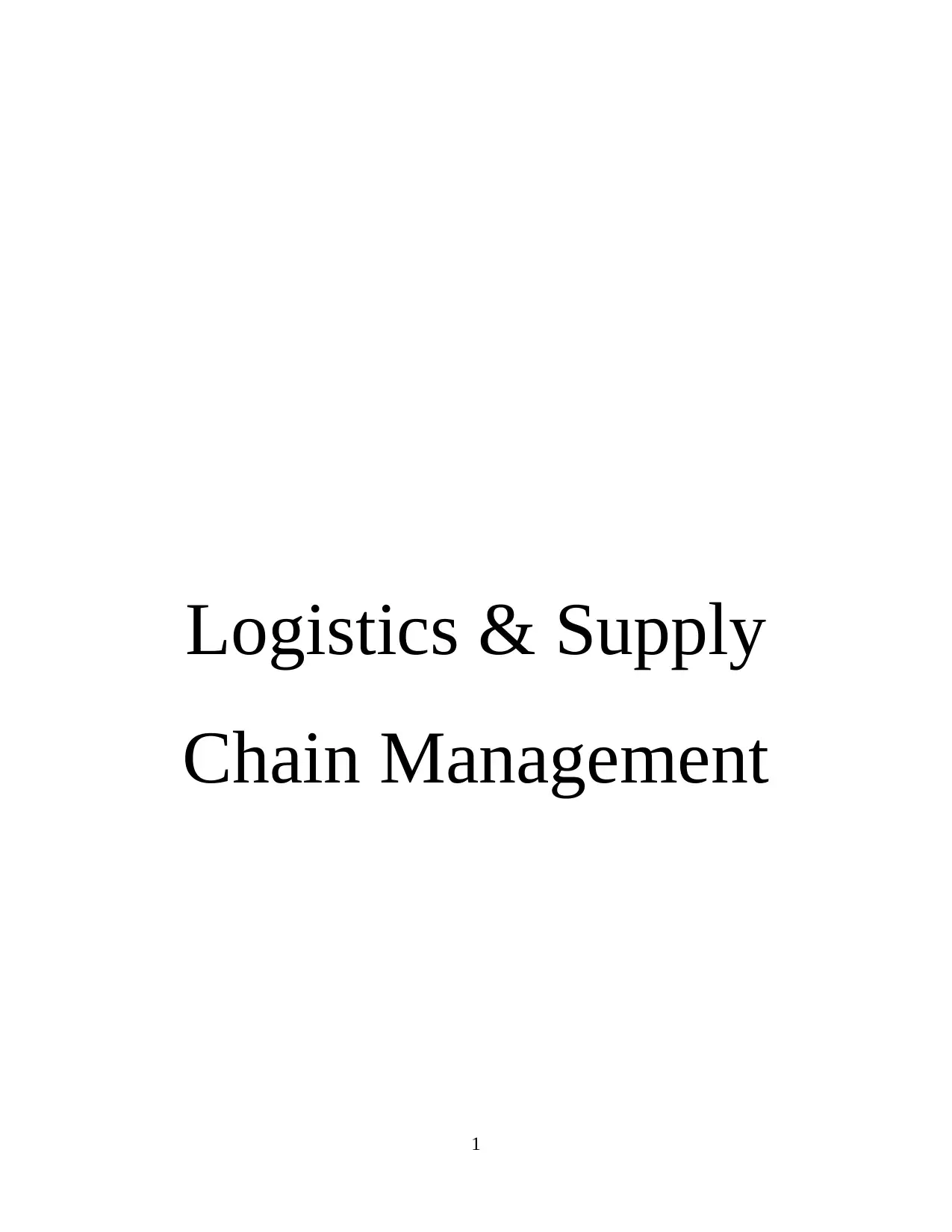
Logistics & Supply
Chain Management
1
Chain Management
1
Paraphrase This Document
Need a fresh take? Get an instant paraphrase of this document with our AI Paraphraser
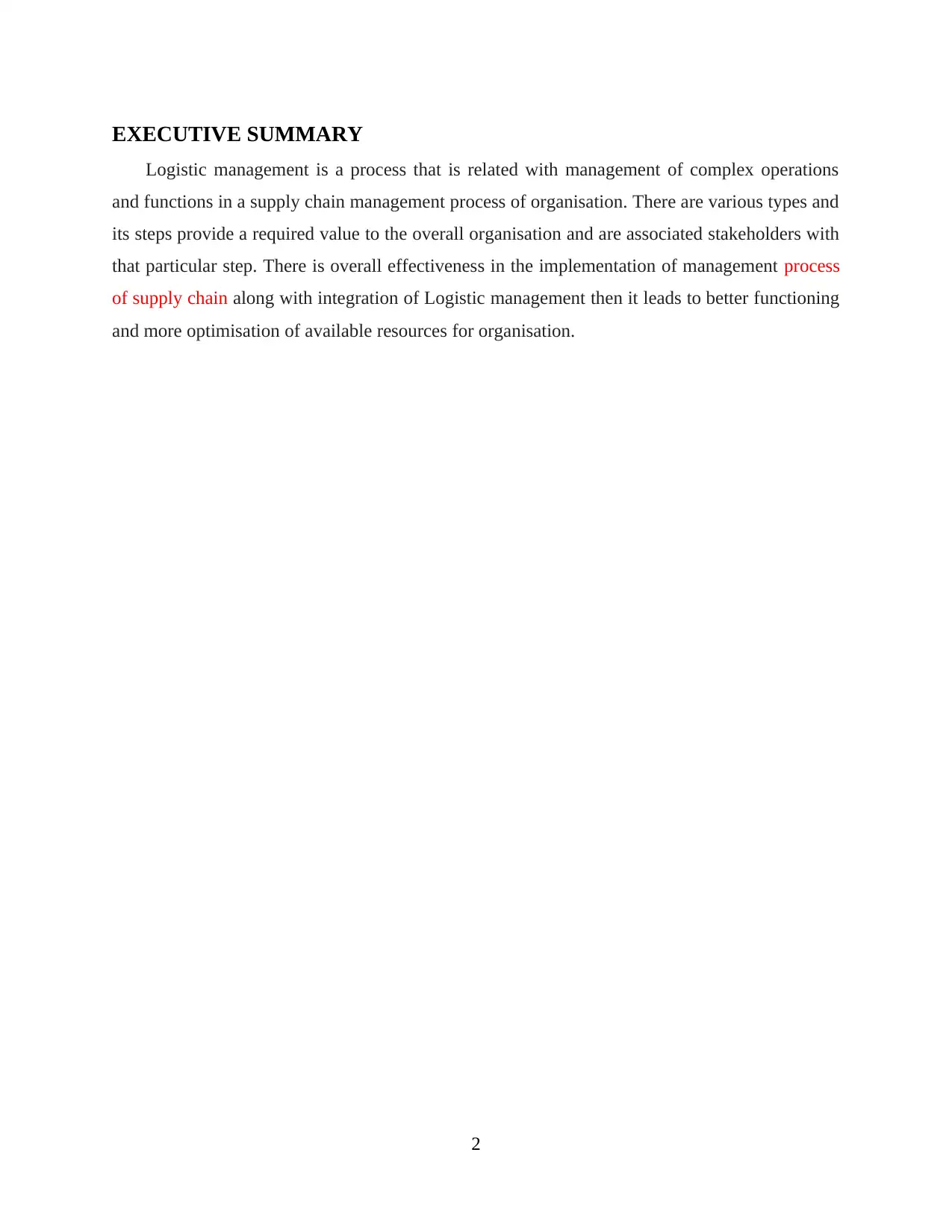
EXECUTIVE SUMMARY
Logistic management is a process that is related with management of complex operations
and functions in a supply chain management process of organisation. There are various types and
its steps provide a required value to the overall organisation and are associated stakeholders with
that particular step. There is overall effectiveness in the implementation of management process
of supply chain along with integration of Logistic management then it leads to better functioning
and more optimisation of available resources for organisation.
2
Logistic management is a process that is related with management of complex operations
and functions in a supply chain management process of organisation. There are various types and
its steps provide a required value to the overall organisation and are associated stakeholders with
that particular step. There is overall effectiveness in the implementation of management process
of supply chain along with integration of Logistic management then it leads to better functioning
and more optimisation of available resources for organisation.
2
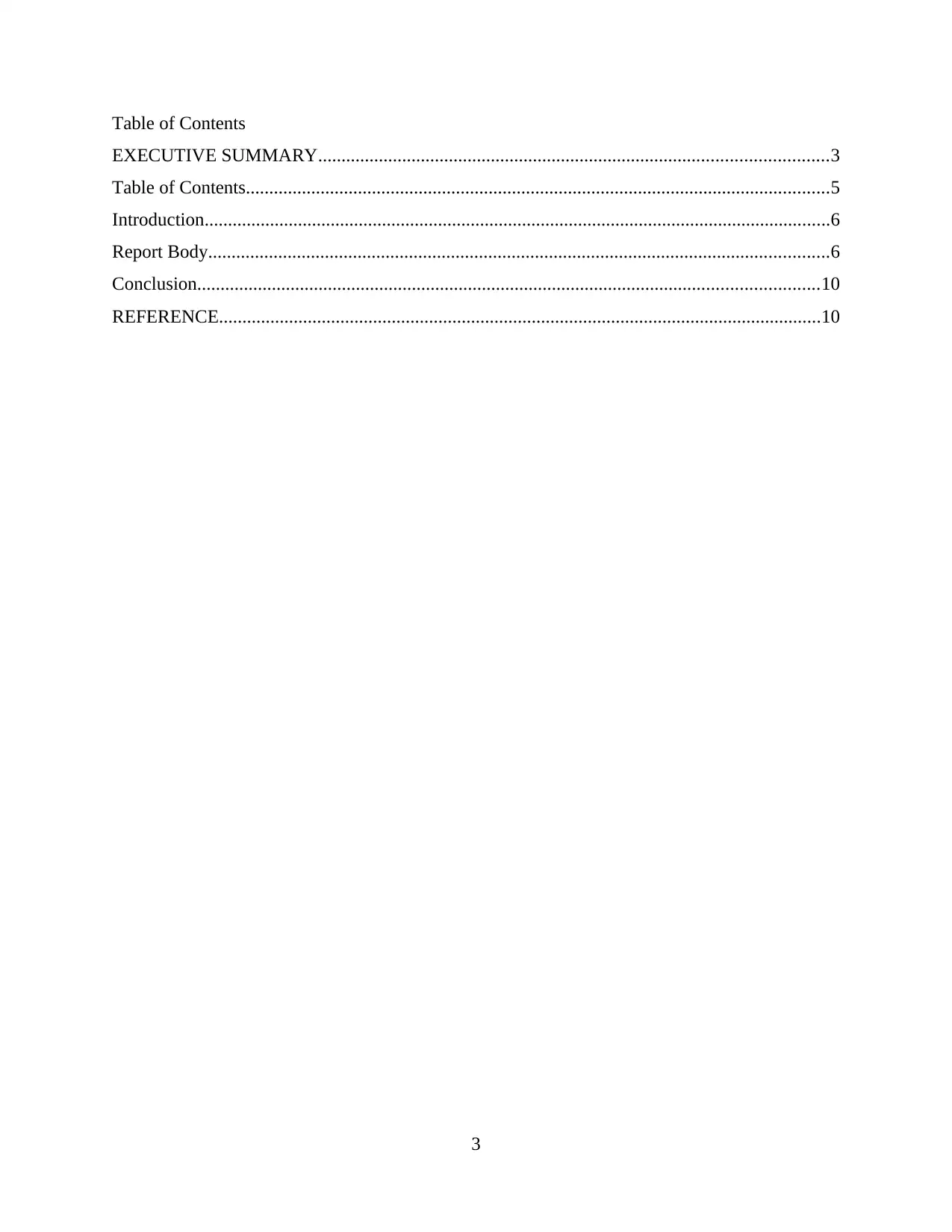
Table of Contents
EXECUTIVE SUMMARY.............................................................................................................3
Table of Contents.............................................................................................................................5
Introduction......................................................................................................................................6
Report Body.....................................................................................................................................6
Conclusion.....................................................................................................................................10
REFERENCE.................................................................................................................................10
3
EXECUTIVE SUMMARY.............................................................................................................3
Table of Contents.............................................................................................................................5
Introduction......................................................................................................................................6
Report Body.....................................................................................................................................6
Conclusion.....................................................................................................................................10
REFERENCE.................................................................................................................................10
3
⊘ This is a preview!⊘
Do you want full access?
Subscribe today to unlock all pages.

Trusted by 1+ million students worldwide
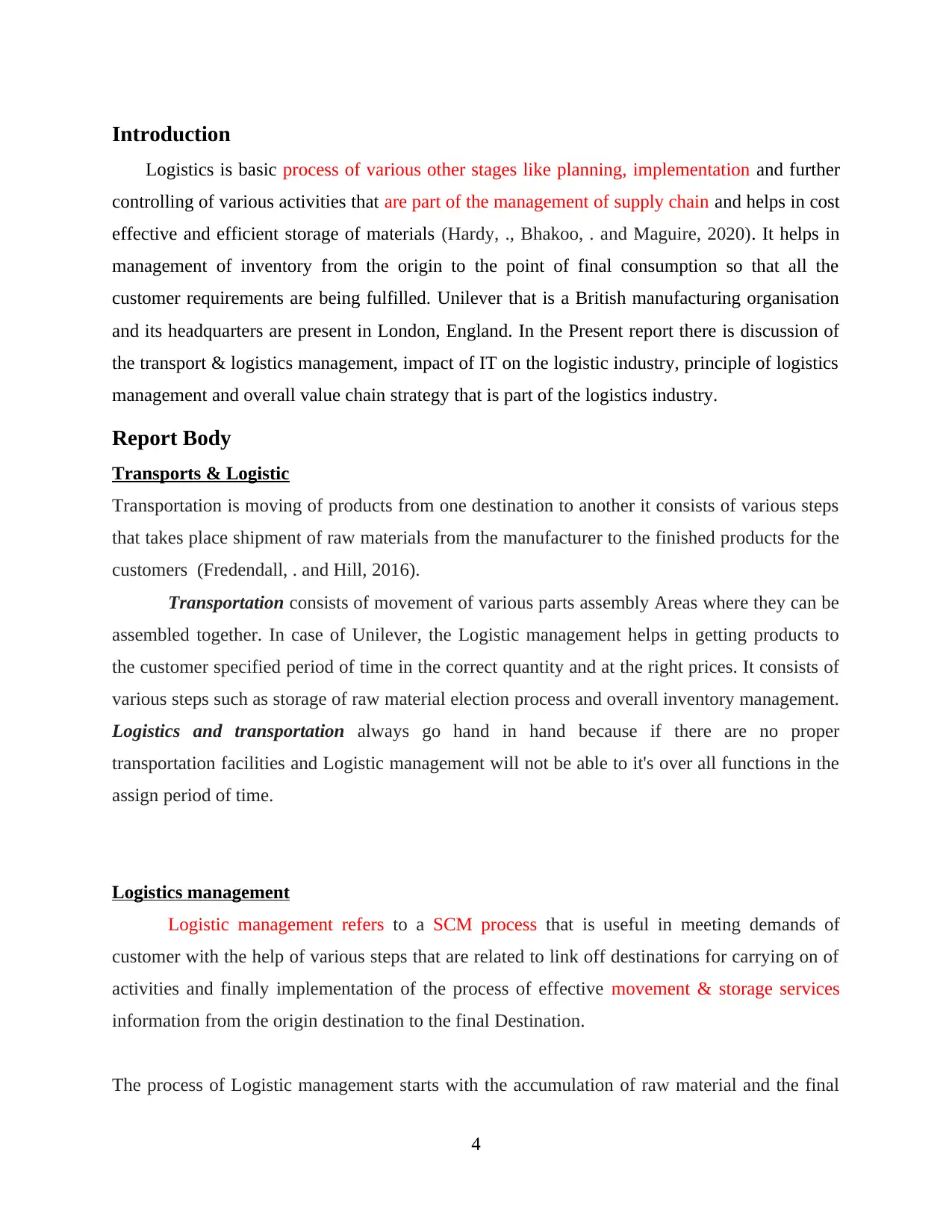
Introduction
Logistics is basic process of various other stages like planning, implementation and further
controlling of various activities that are part of the management of supply chain and helps in cost
effective and efficient storage of materials (Hardy, ., Bhakoo, . and Maguire, 2020). It helps in
management of inventory from the origin to the point of final consumption so that all the
customer requirements are being fulfilled. Unilever that is a British manufacturing organisation
and its headquarters are present in London, England. In the Present report there is discussion of
the transport & logistics management, impact of IT on the logistic industry, principle of logistics
management and overall value chain strategy that is part of the logistics industry.
Report Body
Transports & Logistic
Transportation is moving of products from one destination to another it consists of various steps
that takes place shipment of raw materials from the manufacturer to the finished products for the
customers (Fredendall, . and Hill, 2016).
Transportation consists of movement of various parts assembly Areas where they can be
assembled together. In case of Unilever, the Logistic management helps in getting products to
the customer specified period of time in the correct quantity and at the right prices. It consists of
various steps such as storage of raw material election process and overall inventory management.
Logistics and transportation always go hand in hand because if there are no proper
transportation facilities and Logistic management will not be able to it's over all functions in the
assign period of time.
Logistics management
Logistic management refers to a SCM process that is useful in meeting demands of
customer with the help of various steps that are related to link off destinations for carrying on of
activities and finally implementation of the process of effective movement & storage services
information from the origin destination to the final Destination.
The process of Logistic management starts with the accumulation of raw material and the final
4
Logistics is basic process of various other stages like planning, implementation and further
controlling of various activities that are part of the management of supply chain and helps in cost
effective and efficient storage of materials (Hardy, ., Bhakoo, . and Maguire, 2020). It helps in
management of inventory from the origin to the point of final consumption so that all the
customer requirements are being fulfilled. Unilever that is a British manufacturing organisation
and its headquarters are present in London, England. In the Present report there is discussion of
the transport & logistics management, impact of IT on the logistic industry, principle of logistics
management and overall value chain strategy that is part of the logistics industry.
Report Body
Transports & Logistic
Transportation is moving of products from one destination to another it consists of various steps
that takes place shipment of raw materials from the manufacturer to the finished products for the
customers (Fredendall, . and Hill, 2016).
Transportation consists of movement of various parts assembly Areas where they can be
assembled together. In case of Unilever, the Logistic management helps in getting products to
the customer specified period of time in the correct quantity and at the right prices. It consists of
various steps such as storage of raw material election process and overall inventory management.
Logistics and transportation always go hand in hand because if there are no proper
transportation facilities and Logistic management will not be able to it's over all functions in the
assign period of time.
Logistics management
Logistic management refers to a SCM process that is useful in meeting demands of
customer with the help of various steps that are related to link off destinations for carrying on of
activities and finally implementation of the process of effective movement & storage services
information from the origin destination to the final Destination.
The process of Logistic management starts with the accumulation of raw material and the final
4
Paraphrase This Document
Need a fresh take? Get an instant paraphrase of this document with our AI Paraphraser
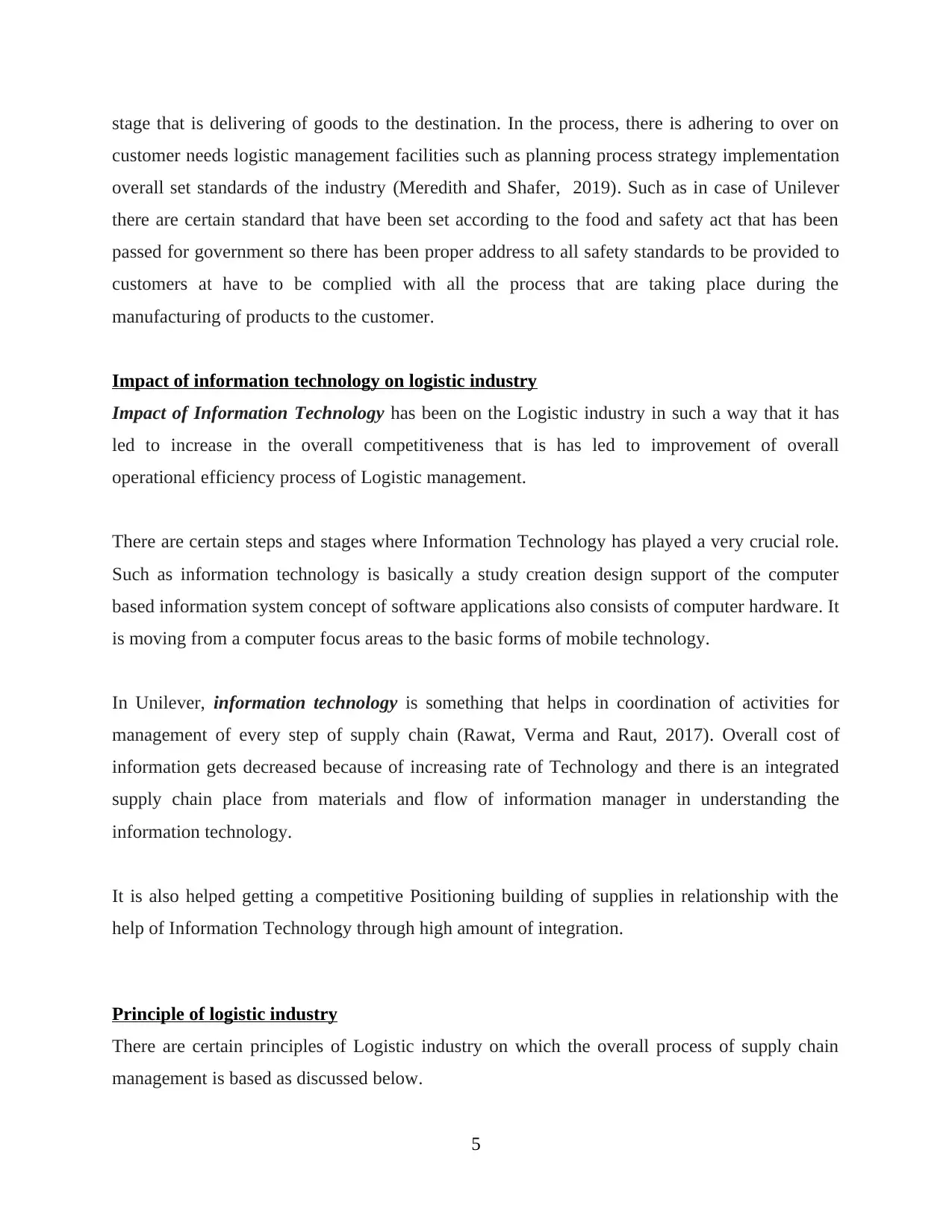
stage that is delivering of goods to the destination. In the process, there is adhering to over on
customer needs logistic management facilities such as planning process strategy implementation
overall set standards of the industry (Meredith and Shafer, 2019). Such as in case of Unilever
there are certain standard that have been set according to the food and safety act that has been
passed for government so there has been proper address to all safety standards to be provided to
customers at have to be complied with all the process that are taking place during the
manufacturing of products to the customer.
Impact of information technology on logistic industry
Impact of Information Technology has been on the Logistic industry in such a way that it has
led to increase in the overall competitiveness that is has led to improvement of overall
operational efficiency process of Logistic management.
There are certain steps and stages where Information Technology has played a very crucial role.
Such as information technology is basically a study creation design support of the computer
based information system concept of software applications also consists of computer hardware. It
is moving from a computer focus areas to the basic forms of mobile technology.
In Unilever, information technology is something that helps in coordination of activities for
management of every step of supply chain (Rawat, Verma and Raut, 2017). Overall cost of
information gets decreased because of increasing rate of Technology and there is an integrated
supply chain place from materials and flow of information manager in understanding the
information technology.
It is also helped getting a competitive Positioning building of supplies in relationship with the
help of Information Technology through high amount of integration.
Principle of logistic industry
There are certain principles of Logistic industry on which the overall process of supply chain
management is based as discussed below.
5
customer needs logistic management facilities such as planning process strategy implementation
overall set standards of the industry (Meredith and Shafer, 2019). Such as in case of Unilever
there are certain standard that have been set according to the food and safety act that has been
passed for government so there has been proper address to all safety standards to be provided to
customers at have to be complied with all the process that are taking place during the
manufacturing of products to the customer.
Impact of information technology on logistic industry
Impact of Information Technology has been on the Logistic industry in such a way that it has
led to increase in the overall competitiveness that is has led to improvement of overall
operational efficiency process of Logistic management.
There are certain steps and stages where Information Technology has played a very crucial role.
Such as information technology is basically a study creation design support of the computer
based information system concept of software applications also consists of computer hardware. It
is moving from a computer focus areas to the basic forms of mobile technology.
In Unilever, information technology is something that helps in coordination of activities for
management of every step of supply chain (Rawat, Verma and Raut, 2017). Overall cost of
information gets decreased because of increasing rate of Technology and there is an integrated
supply chain place from materials and flow of information manager in understanding the
information technology.
It is also helped getting a competitive Positioning building of supplies in relationship with the
help of Information Technology through high amount of integration.
Principle of logistic industry
There are certain principles of Logistic industry on which the overall process of supply chain
management is based as discussed below.
5
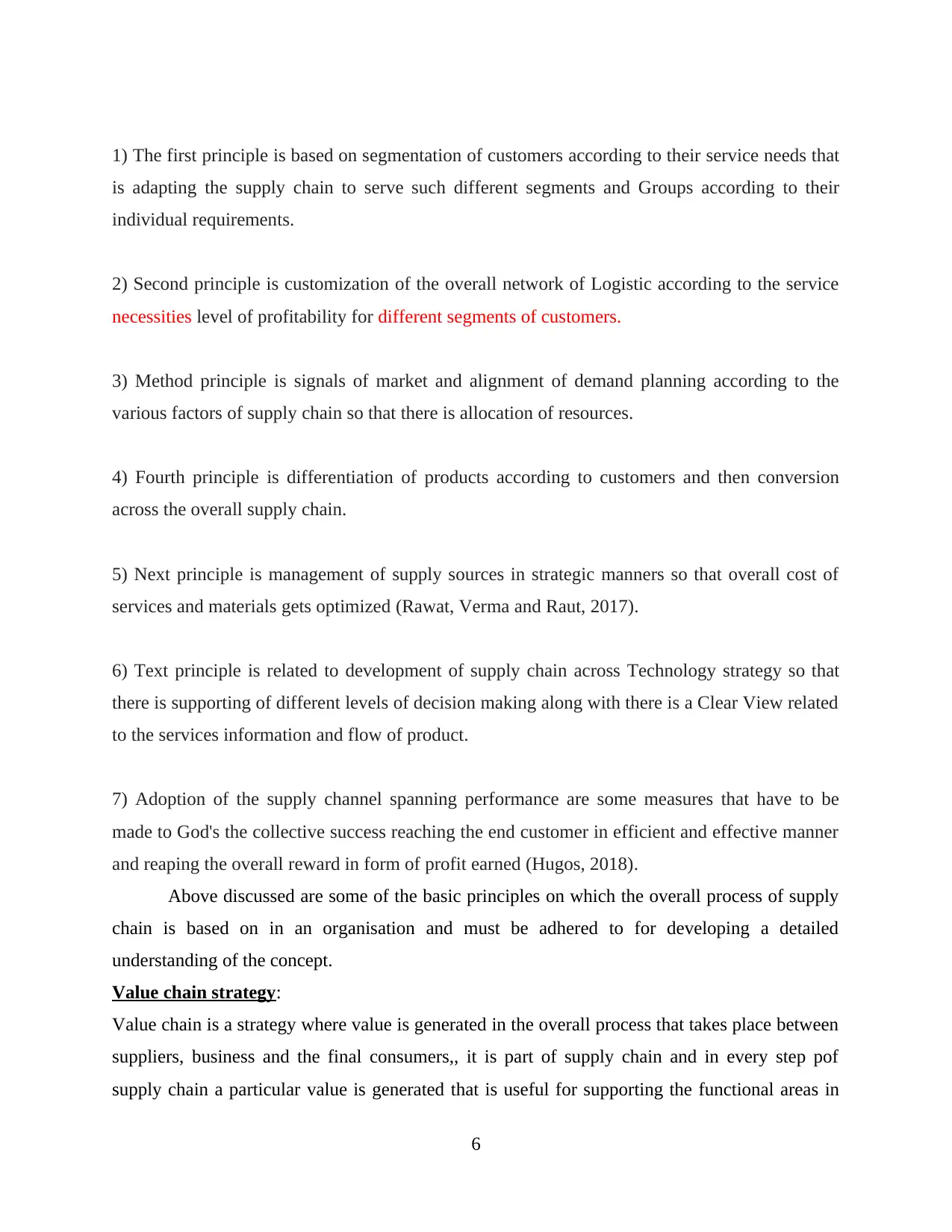
1) The first principle is based on segmentation of customers according to their service needs that
is adapting the supply chain to serve such different segments and Groups according to their
individual requirements.
2) Second principle is customization of the overall network of Logistic according to the service
necessities level of profitability for different segments of customers.
3) Method principle is signals of market and alignment of demand planning according to the
various factors of supply chain so that there is allocation of resources.
4) Fourth principle is differentiation of products according to customers and then conversion
across the overall supply chain.
5) Next principle is management of supply sources in strategic manners so that overall cost of
services and materials gets optimized (Rawat, Verma and Raut, 2017).
6) Text principle is related to development of supply chain across Technology strategy so that
there is supporting of different levels of decision making along with there is a Clear View related
to the services information and flow of product.
7) Adoption of the supply channel spanning performance are some measures that have to be
made to God's the collective success reaching the end customer in efficient and effective manner
and reaping the overall reward in form of profit earned (Hugos, 2018).
Above discussed are some of the basic principles on which the overall process of supply
chain is based on in an organisation and must be adhered to for developing a detailed
understanding of the concept.
Value chain strategy:
Value chain is a strategy where value is generated in the overall process that takes place between
suppliers, business and the final consumers,, it is part of supply chain and in every step pof
supply chain a particular value is generated that is useful for supporting the functional areas in
6
is adapting the supply chain to serve such different segments and Groups according to their
individual requirements.
2) Second principle is customization of the overall network of Logistic according to the service
necessities level of profitability for different segments of customers.
3) Method principle is signals of market and alignment of demand planning according to the
various factors of supply chain so that there is allocation of resources.
4) Fourth principle is differentiation of products according to customers and then conversion
across the overall supply chain.
5) Next principle is management of supply sources in strategic manners so that overall cost of
services and materials gets optimized (Rawat, Verma and Raut, 2017).
6) Text principle is related to development of supply chain across Technology strategy so that
there is supporting of different levels of decision making along with there is a Clear View related
to the services information and flow of product.
7) Adoption of the supply channel spanning performance are some measures that have to be
made to God's the collective success reaching the end customer in efficient and effective manner
and reaping the overall reward in form of profit earned (Hugos, 2018).
Above discussed are some of the basic principles on which the overall process of supply
chain is based on in an organisation and must be adhered to for developing a detailed
understanding of the concept.
Value chain strategy:
Value chain is a strategy where value is generated in the overall process that takes place between
suppliers, business and the final consumers,, it is part of supply chain and in every step pof
supply chain a particular value is generated that is useful for supporting the functional areas in
6
⊘ This is a preview!⊘
Do you want full access?
Subscribe today to unlock all pages.

Trusted by 1+ million students worldwide

form of different functional debarment. Such as in case of Unilever, the value is generated from
different functional areas such as HR, IT and finance.
Value chain strategy is based on the overall value that is generated between the processes and is
directly a part of the supply chain, commercial functional areas. It is part of the overall business
strategy.
7
different functional areas such as HR, IT and finance.
Value chain strategy is based on the overall value that is generated between the processes and is
directly a part of the supply chain, commercial functional areas. It is part of the overall business
strategy.
7
Paraphrase This Document
Need a fresh take? Get an instant paraphrase of this document with our AI Paraphraser
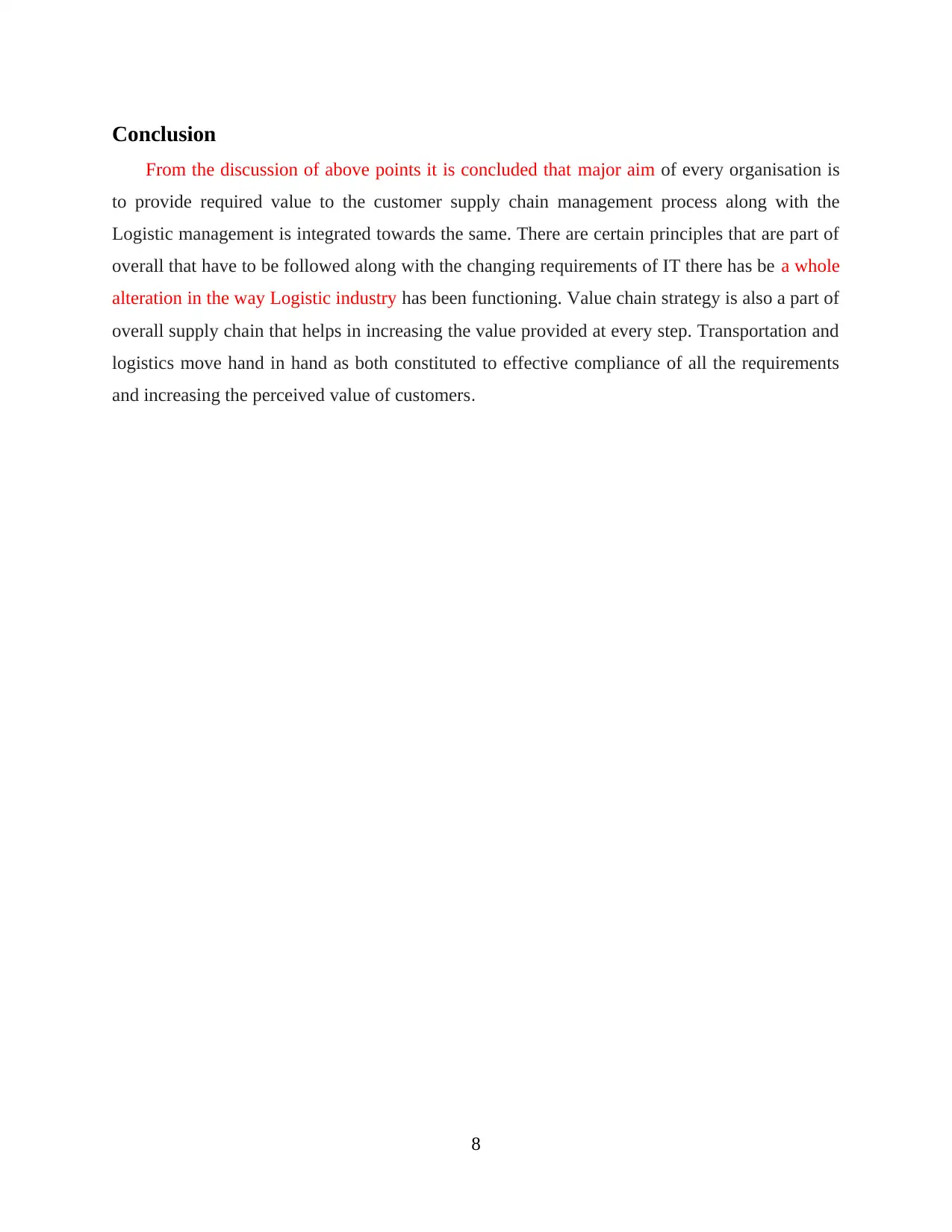
Conclusion
From the discussion of above points it is concluded that major aim of every organisation is
to provide required value to the customer supply chain management process along with the
Logistic management is integrated towards the same. There are certain principles that are part of
overall that have to be followed along with the changing requirements of IT there has be a whole
alteration in the way Logistic industry has been functioning. Value chain strategy is also a part of
overall supply chain that helps in increasing the value provided at every step. Transportation and
logistics move hand in hand as both constituted to effective compliance of all the requirements
and increasing the perceived value of customers.
8
From the discussion of above points it is concluded that major aim of every organisation is
to provide required value to the customer supply chain management process along with the
Logistic management is integrated towards the same. There are certain principles that are part of
overall that have to be followed along with the changing requirements of IT there has be a whole
alteration in the way Logistic industry has been functioning. Value chain strategy is also a part of
overall supply chain that helps in increasing the value provided at every step. Transportation and
logistics move hand in hand as both constituted to effective compliance of all the requirements
and increasing the perceived value of customers.
8
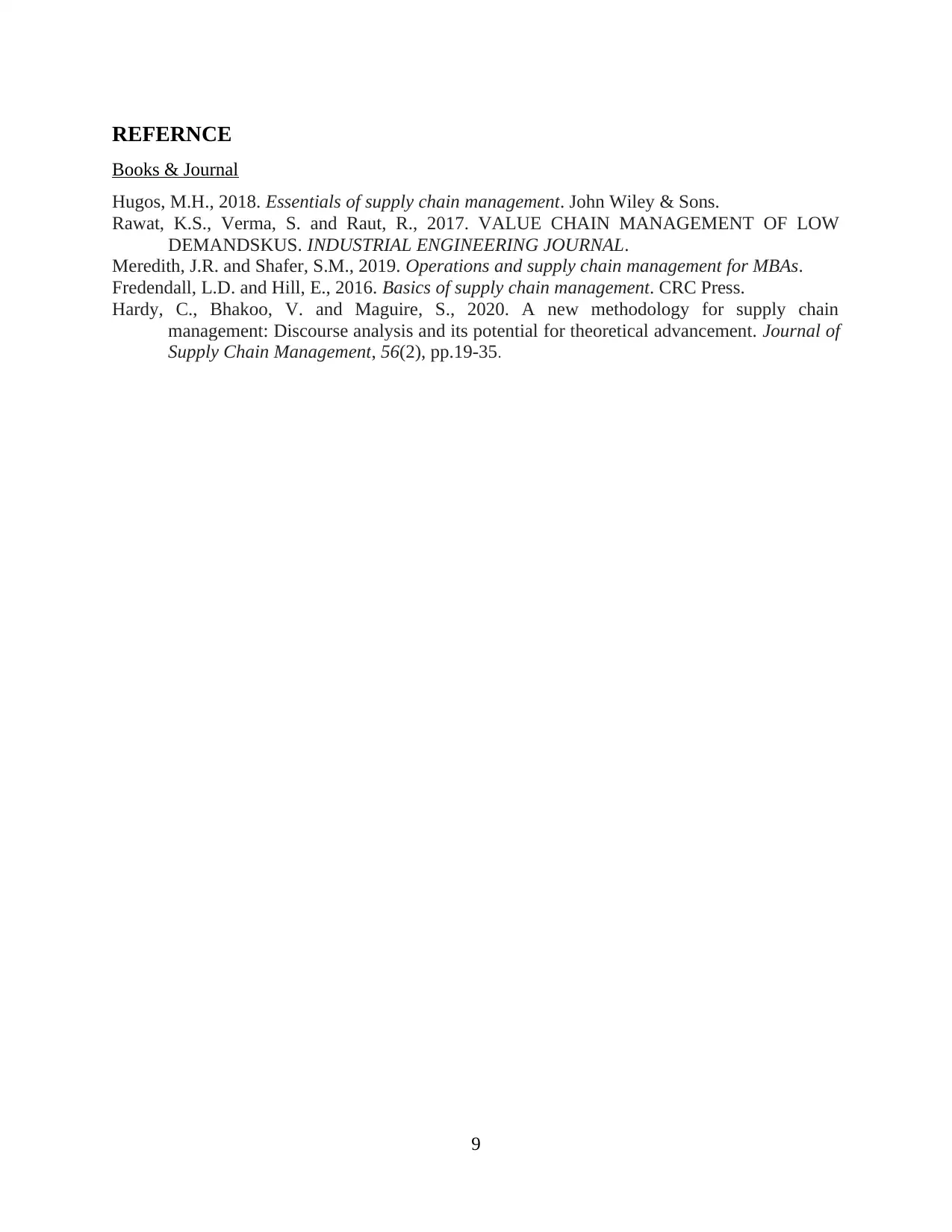
REFERNCE
Books & Journal
Hugos, M.H., 2018. Essentials of supply chain management. John Wiley & Sons.
Rawat, K.S., Verma, S. and Raut, R., 2017. VALUE CHAIN MANAGEMENT OF LOW
DEMANDSKUS. INDUSTRIAL ENGINEERING JOURNAL.
Meredith, J.R. and Shafer, S.M., 2019. Operations and supply chain management for MBAs.
Fredendall, L.D. and Hill, E., 2016. Basics of supply chain management. CRC Press.
Hardy, C., Bhakoo, V. and Maguire, S., 2020. A new methodology for supply chain
management: Discourse analysis and its potential for theoretical advancement. Journal of
Supply Chain Management, 56(2), pp.19-35.
9
Books & Journal
Hugos, M.H., 2018. Essentials of supply chain management. John Wiley & Sons.
Rawat, K.S., Verma, S. and Raut, R., 2017. VALUE CHAIN MANAGEMENT OF LOW
DEMANDSKUS. INDUSTRIAL ENGINEERING JOURNAL.
Meredith, J.R. and Shafer, S.M., 2019. Operations and supply chain management for MBAs.
Fredendall, L.D. and Hill, E., 2016. Basics of supply chain management. CRC Press.
Hardy, C., Bhakoo, V. and Maguire, S., 2020. A new methodology for supply chain
management: Discourse analysis and its potential for theoretical advancement. Journal of
Supply Chain Management, 56(2), pp.19-35.
9
⊘ This is a preview!⊘
Do you want full access?
Subscribe today to unlock all pages.

Trusted by 1+ million students worldwide

10
Paraphrase This Document
Need a fresh take? Get an instant paraphrase of this document with our AI Paraphraser

11
1 out of 11
Related Documents
Your All-in-One AI-Powered Toolkit for Academic Success.
+13062052269
info@desklib.com
Available 24*7 on WhatsApp / Email
![[object Object]](/_next/static/media/star-bottom.7253800d.svg)
Unlock your academic potential
Copyright © 2020–2026 A2Z Services. All Rights Reserved. Developed and managed by ZUCOL.





